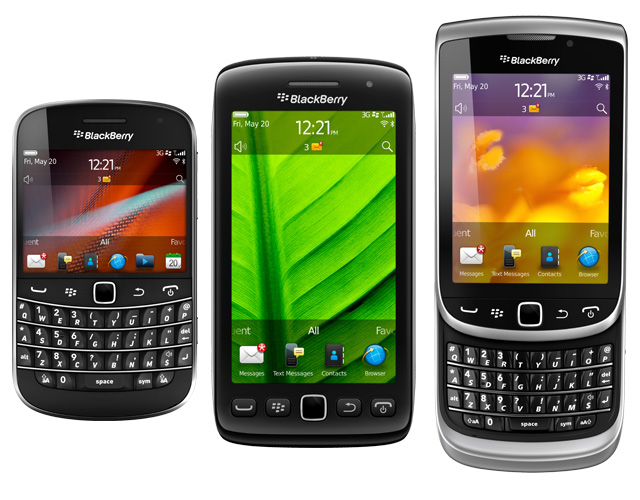Research in Motion on Wednesday debuted five new BlackBerry smartphones featuring the new BlackBerry 7 OS. The new devices include the BlackBerry Torch 9810 (right), BlackBerry Bold 9900 (left), and BlackBerry Torch 9860 (center). Three of the devices will be available in the coming months from AT&T, while two will appear on Sprint.
RIM has been struggling in the past year to show investors and consumers that it will continue to be a serious player in the smartphone market. With Apple’s iOS, Google’s Android, and Microsoft’s Windows Phone 7 platforms all rapidly innovating, RIM has to release something to show that it still matters. That said, these incrementally upgraded devices may not be enough to change the tide.
All of the new devices are powered by a 1.2-GHz processor and have 768MB of onboard RAM. But each phone has its own perks, whether it’s 4G connectivity or a revamped design. First up is 4G HSPA+ connected BlackBerry Torch 9810, which will launch on AT&T some time in August. The 4G HSPA+ BlackBerry Bold 9900 and the touch-screen slab BlackBerry Torch 9860 will both arrive on AT&T later this year. Sprint has yet to release launch details for its BlackBerry Torch 9850 and Bold 9930, which are extremely similar to the models on AT&T but have a CDMA chipset rather than an HSPA one.
“The new OS7 devices are significant improvements, and RIM hasn’t launched new phones in over a year or even longer for CDMA carriers like Verizon Wireless and Sprint,” Avi Greengart, a research director at Current Analysis, told VentureBeat. “I expect RIM will see a short-term sales pop as people who are not looking to leave the platform (due to corporate mandate, personal preference for RIM’s keyboards and email efficiency, or BBM addiction) finally have something worth upgrading to.”
But Greengart rightfully points out that in the wider scope of things, BlackBerry OS 7 is still fundamentally the same operating system as previous BlackBerrys. Many discerning consumers, especially in North America, are not looking for this sort of experience any longer.
“Consumers looking for a device created from the ground up with finger-based navigation, media consumption, and apps will be better served with alternatives from Apple, Google, Microsoft, and HP (should it start getting some traction),” said Greengart.
But if RIM has one hope for maintaining some sales, it could be outside the U.S. and Canada. “It is important to remember that RIM’s existing products are selling exceptionally well in some markets outside North America, and while those tend to be entry-level products, it is possible that these new, vastly better, versions will appeal there too,” Greengart said.
RIM is currently planning to release phones with the QNX tablet OS, which we saw a preview of with the BlackBerry PlayBook tablet. We’ll have to wait and see just how different those devices are from what’s being currently offered and if they can cut through the deafening hype surrounding Apple’s iOS and Google’s Android platforms.
VentureBeat's mission is to be a digital town square for technical decision-makers to gain knowledge about transformative enterprise technology and transact. Learn More


